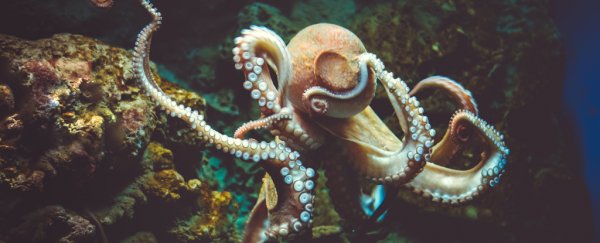Scientists have already established that octopuses are smarter than your average invertebrate, but a new discovery suggests one of the reasons why: a specific molecular analogy with the human brain.
Both the human genome and the octopus genome contain a high number of 'jumping genes' or transposons, which are able to duplicate themselves or move around the genome. While they're not all active, these transposons are seen as raw materials for evolutionary processes.
In a new study, transposons belonging to the LINE (Long Interspersed Nuclear Elements) family have been discovered in the part of the octopus brain that handles cognitive abilities – a similar spot to where they can be found in the human brain.
"I literally jumped on the chair when, under the microscope, I saw a very strong signal of activity of this element in the vertical lobe, the structure of the brain which in the octopus is the seat of learning and cognitive abilities, just like the hippocampus in humans," says biologist Giovanna Ponte from the Stazione Zoologica Anton Dohrn research institute in Italy.
Recent research has revealed how LINE transposons are carefully regulated in the human brain, and the thinking is that they're linked to learning and memory – in part because they're most active in the hippocampus, where learning processes are controlled from.
By finding these jumping genes in the same spot in the brains of two octopus species – the common octopus (Octopus vulgaris) and the Californian octopus (Octopus bimaculoides) – the researchers think they may have found a key reason behind the high intelligence exhibited by these marine creatures.
While transposons are known to use molecular copy-and-paste and cut-and-paste mechanisms, the study suggests that there is more going on here – that there's a direct relationship to the complexity of the nervous system, including the brain.
"The discovery of an element of the LINE family, active in the brain of the two octopuses species, is very significant because it adds support to the idea that these elements have a specific function that goes beyond copy-and-paste," says computational genomicist Remo Sanges from the Scuola Internazionale Superiore di Studi Avanzati research institute in Italy.
What's more, the researchers think that we could be looking at an example of convergent evolution: when similar traits develop independently in completely unrelated species, and provide the same adaptation, which in this case is superior cognitive abilities.
Scientists continue to find evolutionary tricks and neurological responses that make octopuses stand out amongst invertebrates, and which make them more like mammals in terms of the structure and the activity of the brain.
"The brain of the octopus is functionally analogous in many of its characteristics to that of mammals," says biologist Graziano Fiorito from Stazione Zoologica Anton Dohrn.
"For this reason, also, the identified LINE element represents a very interesting candidate to study to improve our knowledge on the evolution of intelligence."
The research has been published in BMC Biology.
